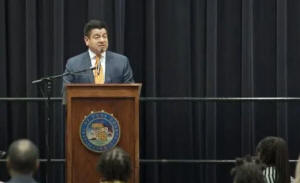Illinois Chamber opposes several measures headed for Pritzker's desk
 Send a link to a friend
Send a link to a friend
 [June 13, 2024]
By Catrina Petersen | The Center Square [June 13, 2024]
By Catrina Petersen | The Center Square
(The Center Square) – Illinois business groups are opposed to measures
they say are prohibitive to job creators and business owners but could
expand employee privacy and address political and religious speech in
the workplace.
The Illinois Chamber of Commerce 2024 End of Session Report details how
the actions of the state government impact members of the business
community. The chamber is opposed to several bills headed to the
governor’s desk for his signature.
"Advocacy is one of the Chamber’s core products and we once again worked
tirelessly this year to effectuate change under the capitol dome and in
every corner of the state," Chamber President and CEO Lou Sandoval said.
"We ushered in the introduction and passage of numerous legislative
initiatives. And, of course, we opposed and negotiated countless bills
that would have an adverse effect on business operations in the state."
Senate Bill 2979 deals with employers collecting biometric information.
The bill seeks to reform the Illinois' Biometric Information Privacy Act
(BIPA), but the business community said it doesn’t go far enough.
State Rep. Jeff Keicher, R-Sycamore, explained employers may use, for
example, a thumbprint time clock to prevent non-employees from entering
the place of business.
“What would be the protocol in place so an employer could use a
thumbprint clock and not be in violation of BIPA once this legislation
is in place?” Keicher asked on the House floor.

Current BIPA language prevents the unauthorized use of biometric
technology that could be used to improve security and allows damages
each time such information is improperly collected without proper
consent. The approved measure limits damages to only one violation per
person, not per scan.
The chamber wanted to see a security exemption included, but otherwise
they call the bill an improvement to the current act.
The bill’s sponsor, state Rep. Ann Williams, D-Chicago, said businesses
could still use a thumbprint time clock but the employer would have to
give notice and obtain consent.
“It is notice and consent that your biometric information is being
collected. I will note that while that issue comes up in the workplace
setting, this is also about your face being scanned when you go to a
place of business, your place of worship to really anywhere in your
community,” said Williams. “Many states, your biometric information is
collected without your knowledge. Here, we have the foresight to protect
that information.”
Keicher also made mention that the trucking industry, which uses facial
recognition technology to ensure trucker drivers are awake.
“I’m worried about a trucking firm out of Nebraska that’s taking a load
out to New Jersey, transits I-80 and crosses into Illinois and has
constant monitoring on the driver … they would be in violation of the
BIPA statute?” Keicher asked.
[to top of second column]
|

Illinois Chamber of Commerce President and CEO Lou Sandoval during
the Pathways to Cook County Summit in Chicago - Cook County
Government / YouTube

Williams said that hypothetical would be a jurisdictional issue and
something for the courts to decide.
“Making Illinois roads less safe was never the intent of the original
BIPA language,” the Illinois Chamber of Commerce said in their report.
Concerns were also expressed about data centers fleeing Illinois because
the bill enhances penalties for businesses who collect data without
consent. However, in the data center’s case, most of the time businesses
task the center with storing the data but there’s no real way to know if
that business obtained consent first. Republicans warn data centers
can’t comply with the proposed changes to BIPA.
Another bill the chamber's report detailed their opposition to is Senate
Bill 3649. The bill prohibits employers from requiring employees to
attend employer-sponsored meetings designed to communicate the opinion
of the employer about religious or political matters.
State Rep. Dan Ugaste, R-Geneva, said he’s all for workers’ rights but
doesn’t want to limit the rights of Illinois employers and businesses.
“What about the right of a store that opens up to sell Christian, Muslim
or Jewish items? Under this bill they aren’t exempted. I believe this
will lead to a lot of litigation and our attorney general is going to
spend a lot of time and resources defending,” said Ugaste.
After Ugaste raised concerns about religious and political organizations
not being exempt, an amendment added ensures the act does not prohibit
certain organizations, such as political organizations, the General
Assembly or religious organizations, from requiring their employees to
attend employer-sponsored meetings.
The bill’s sponsor, state Rep. Marcus Evans, D-Chicago, said employees
want to go to work and don’t want to be burdened by their employer’s
opinions.
“Workers want to work and they don’t want to be mandated to attend
waste-of-time meetings and they don’t want to be inundated with stress,”
said Evans.
The Teamsters union urged Pritzker to sign the bill, saying it would ban
mandatory attendance to employer-sponsored presentations filled with
what they said would be anti-union propaganda designed to discourage
organization efforts.
If enacted, employers could face $1,000 fines if they’re caught
requiring employees to go to employer-sponsored meetings.
 |